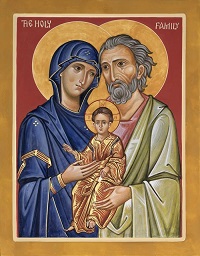
Lectionary readings: Sirach 3:2-6, 12-14, Colossians 3:12-21, Luke 2:41-52
Set against the background of our preliminary readings from Sirach and Colossians, today’s gospel reading is almost playful.
Pious interpretation may hesitate to suggest that the twelve-year-old Jesus, who had lingered in the temple to begin practicing the craft of rabbinical debate, was teasing his anxious parents. “Why were you looking for me?” he asks them. “Did you not know that I must be in my Father’s house?” Jesus may not have been teasing but nothing prevents us from noticing how Luke the gospel writer was playfully teasing his readers.
Who is this lad?, Luke leaves us wondering. Obviously he’s precocious, but what does his youthful interest and ability portend? Oh, and apparently his Father is not exactly his father. What then are the family dynamics in this, his Holy Family that is still a quite human family?
As we first read from Sirach and then from Colossians, we might already notice gospel transformation at work. Sirach is wisdom literature. As such it locates Hebrew faith in the context of the best thinking and counsel of all other peoples. Its perspective on family relations, and its advice to the young, is entirely conventional. Every ancient culture insisted on reverence and obedience to parents, after all. One did not have to hear the Ten Commandments, much less the good news of God’s dawning Kingdom as Jesus later proclaimed it, to know this.
Throughout the Mediterranean and Ancient Near East into which the gospel entered, conventional wisdom was also that women must obey men and wives obey husbands. While the words attributed to St. Paul in Colossians 3:18, calling wives to be subordinate to their husbands, may now grate in many of our modern ears, listening carefully we may notice the gospel message transforming such conventional counsel by placing it in very different context. The previous paragraph (Col. 3:12-17) has just urged all believers to live into a community life of patience, mutual forbearance, mutual forgiveness, peace, and gratitude. All of life – “whatever you do, in word or in deed … everything” – is to reflect the character and “name” of Jesus Christ. The gospel innovation, then, is that conventional obligations of wives to husbands or children to parents begin to come with mutual obligations of husbands to wives and fathers to children.
What really makes a family holy as it heeds such exhortations, is that it points beyond itself, with a witness to more than its own interests, survival, or even family values. Family cohesion and survival were the great anxiety of ancient clans and aristocratic estates alike. But the earliest words of Jesus we have in the New Testament point beyond. The Jesus who already had business in “my Father’s house” is the Jesus who will go on gather a larger family and proclaim a wider Kingdom.
By the end of today’s gospel reading Luke is assuring us that the youthful Jesus too was loyal and obedient to his parents. But not before he allows Jesus to shake us up. Not before he insists that Jesus was already understanding something his parents, like all anxious and risk-averse parents, easily forget. Namely, the test of holiness for even the holiest of families is that it train but then release its members to serve the purposes of God, which extend far beyond them.
Dr. Gerald Schlabach
Professor of Theology
Originally posted by the University of St. Thomas Office of Mission